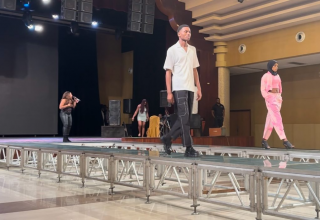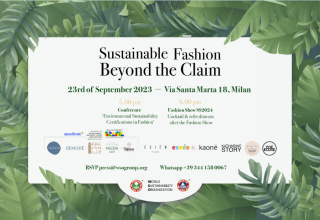
With the Gulf of Mexico on fire, icebergs melting at an alarming rate and entire species going extinct, the conversation around climate change and sustainability is more relevant now more than ever. A recurring culprit seems to be the fast fashion industry, which is constantly being accused of unethical work practices and unsustainable production methods. In light of this, here are 6 sustainable African brands you should get to know today!
Studio One Eighty Nine
Studio One Eighty Nine is a Ghanaian brand which is known not only for its unique look but also its dedication to sustainability. Having won the CFDA award for Sustainable fashion, Studio One Eighty Nine is a brand that is very obviously conscious of its socioeconomic impact. The brand itself is excellent. The garments produced by the brand are made using various traditional techniques such as tie dye and wax printing, in contemporary styles that make the brand feel modern yet timeless and familiar to the African consumer.
Tongoro
Based in Senegal, Tongoro is quite a popular brand, having been worn by the likes of Burna Boy, Naomi Campbell and Beyonce to name a few. The brand’s women’s wear consists of flowy dresses in black and white as well as rich earthy colour schemes, characterised by mesmerising, intricate patterns. The men’s wear carries a similar feel with semi-formal shirt/pant sets in earthy tones with a nice loose fit. The garments made by Tongoro are very versatile as they can be worn for just about any occasion from a fancy banquet to a casual brunch. With sustainability at the forefront of the brand’s values, Tongoro strives to produce in ways that are socially equitable, economically viable and protect the environment. Tongoro aims to aid the economic and social development of artisanal craftsmanship in Africa.
Alledjo
Another Senegalese brand, Alledjo garments are made with light breezy fabrics with the brand’s main material of choice being silk. The brand employs a mixture of simple and complex designs on garments that look clean and minimalistic making the brand feel luxurious yet simplistic. The brand aims to modernise African couture while preserving its rich history and culture by supporting local artisans. Alledjo also offers long-term jobs to African creatives and craftsmen.
Kenneth Ize
Nigerian designer Kenneth Ize is another very famous person on this list. Having had the likes of Naomi Campbell not only publicly wear and support his clothing, but the supermodel also walked his debut AW20 Paris Fashion Week show. Kenneth Ize seeks to redefine the meaning of luxury through sustainable means. The production of Ize’s garments involves various upcycling techniques, employing local artisans, ethical treatment of workers and ethical sourcing of materials. Kenneth Ize as a brand is definitely luxurious. The construction of garments are structured and sharp with bright colours and unique colour schemes and patterns. Kenneth Ize is definitely one of the poster brands for high end sustainability.
Elisha Bamfo
Ghanaian designer Elisha Ofori Bamfo, is turning plastic waste into beautiful abstract contemporary pieces of clothing. Bamfo is an avid sustainable fashion advocate and recycles plastic waste into cutting edge, stylish clothing. His pieces are vibrant and futuristic, proving that recycling can be chic.
Kente gentleman
Kente Gentleman is an Ivory Coast based brand. Each piece produced by the brand is handmade and heavily influenced by authentic West African craftsmanship as well as the ever timeless kente cloth (as the name suggests). The brand is classy, consisting of a plethora of blazer/pant sets, shirts and crop shirts in vibrant colours and designs. The construction of garments is crisp and clean and perfect for anyone who wants a sophisticated look with a splash of personality. The brand proudly supports its local clothing and textile making industry.
Some brands on the list may look a bit pricey but remember that fashion is an investment! Buying a garment you could wear for 5 years + is far less harmful to the environment than constantly rotating your closet every six months. The secret to an iconic wardrobe is having staple pieces that can be worn and styled in countless ways. Sustainable clothing is an investment everyone should start making.
WRITTEN BY: Nii Ako-nai















